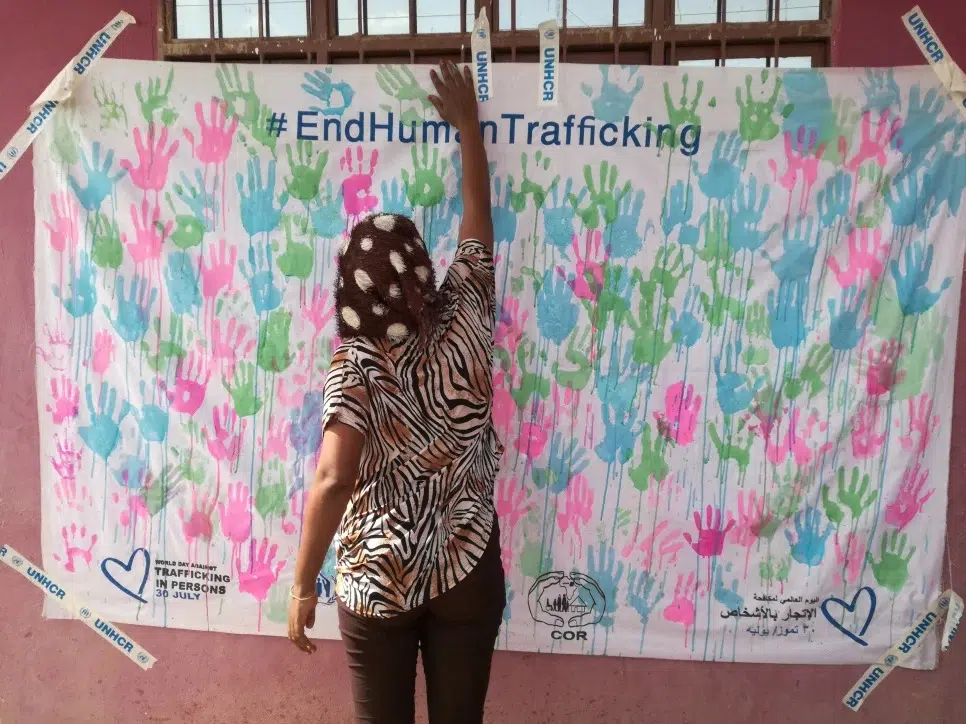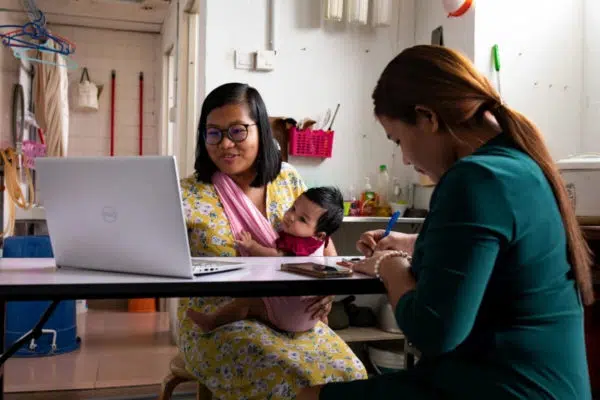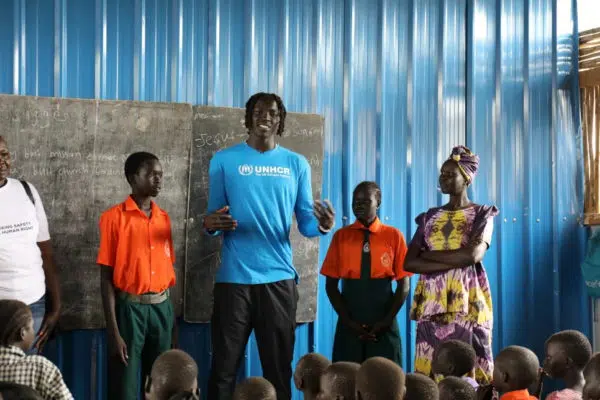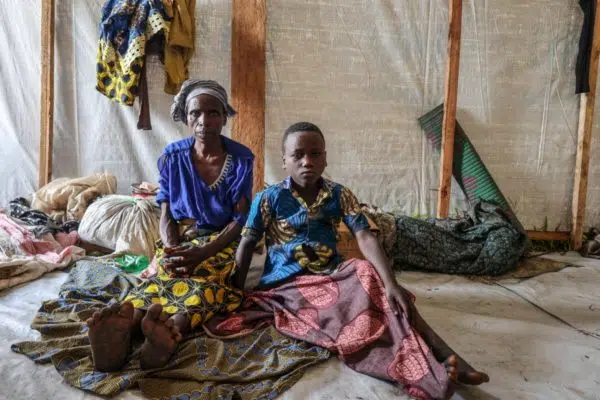
A refugee whose family were impacted by human trafficking shows her support for UNHCR’s anti-trafficking campaign in eastern Sudan. © UNHCR/Osama Idriss
GENEVA – Protection services are severely lacking for refugees and migrants making perilous journeys from the Sahel and Horn of Africa towards North Africa and Europe, including survivors of human trafficking, UNHCR, the UN Refugee Agency warned today.
In a report released today, the eve of World Day against Trafficking in Persons, UNHCR mapped protection services available to asylum-seekers, refugees, and migrants as they travel along these routes.
Some victims are left to die in the desert, others suffer repeated sexual and gender-based violence, kidnappings for ransom, torture, and many forms of physical and psychological abuse.
The report is the second of its kind and highlights the gaps in available protection services, notably in shelter, access to justice, identification of survivors and the provision of responses to gender-based violence, trafficking, and for unaccompanied and separated children. It covers 12 countries: Burkina Faso, Cameroon, Chad, Cote d’Ivoire, Djibouti, Ethiopia, Mali, Mauritania, Morocco, Niger, Somalia, and Sudan.
“I am appalled by the abuses that refugees and migrants face as they travel through the Sahel and the East and Horn of Africa towards North Africa, and sometimes on to Europe,” said UNHCR Special Envoy for the Central and Western Mediterranean Situation, Vincent Cochetel. “Too many lives have been lost or broken on these routes.”
Cochetel stressed the urgent need for more funding to implement better services for preventing human trafficking, identifying and supporting survivors, ensuring access to asylum for victims and those at risk of trafficking who need international protection, as well as bringing perpetrators to justice.
He also cited the need for States, UN bodies, civil society and NGOs to redouble efforts to implement existing international frameworks like the UN Palermo Protocols on human trafficking and smuggling as the best collective means to save lives and combat these crimes.
Given the global expansion in the use of technology and online platforms enabling traffickers and smugglers to advertise their services and lure unsuspecting victims, part of the new effort, he added, must also involve collaboration among States and the private sector to crack down on the use of the Internet by traffickers to identify, groom and recruit victims, including children. Digital technologies can also be leveraged, however, to provide communities with trustworthy information on the risks of irregular journeys, including trafficking, and empower them with tips and information on safe options. All measures to respond to human trafficking and smuggling, including online, must be compliant with international law and human rights standards.
The report, ‘Mapping of Protection Services for Vulnerable People on the Move, Including Victims of Trafficking,’ provides tailored information for refugees and migrants on services that are currently available on the different routes. It also serves as a reference for donors to target investments in resources where they are most needed, and to the actors best placed to provide these essential services.
To support and assist survivors, it urges the introduction of community-based shelters and safe spaces, better access to legal services; and differentiated services for children and female survivors of trafficking and gender-based violence. It also identifies critical locations on the routes that serve as “last stops” before refugees and migrants embark on further journeys across the Sahara. Failing to plug service gaps in such locations misses an opportunity to help people to access protection and safety rather than forge ahead with life-threatening onward travel.
In April 2022, UNHCR published an updated strategy on “Protection, Saving Lives and Solutions for Refugees in Dangerous Journeys – along routes towards Europe across the Central and Western Mediterranean Sea and the Atlantic” This hybrid strategy and appeal called for US$163.5 million to assist and protect thousands of refugees and others. It is currently only 30% funded.
Notes:
Globally, UNHCR works with multiple UN agencies, particularly IOM and UNODC, as well as regional and national partners, to develop initiatives to address human trafficking. These include the 2020 Joint Framework Document on the development of Standard Operating Procedures to facilitate the identification and protection of victims of trafficking, with IOM, and a separate pilot initiative with IOM and UNODC to work with States to protect and assist victims of trafficking. Human trafficking is specifically addressed in the 2018 Global Compact on Refugees (GCR).
UNHCR calls on all States to ratify and apply all the international standards relevant to prevention, protection and prosecution in the context of human trafficking.
For more information on this topic, please contact:
- In Geneva, Boris Cheshirkov, cheshirk@unhcr.org, +41 79 433 7682 (for Africa)
- In Geneva, Shabia Mantoo, mantoo@unhcr.org, + 41 79337 7650
Originally published by UNHCR on 29 July 2022





